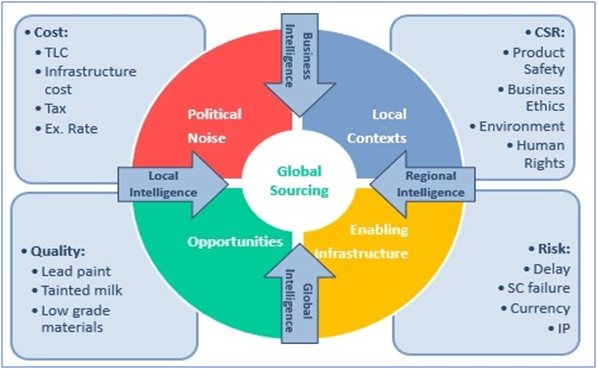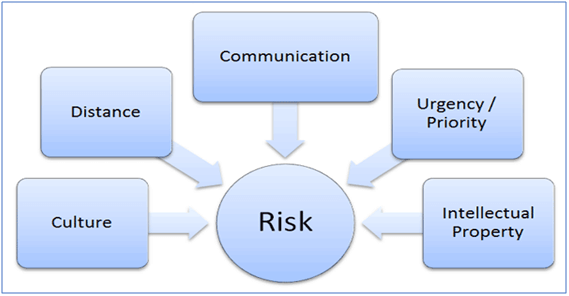The development of the economic globalization makes the global sourcing extend to all parts of the world, global procurement has certain advantages, but the inevitable risk also exists, during the global sourcing process, companies must face these risks, take active and effective to mitigating risks.
With the rapid development of economic globalization, the economic dependence among countries around the world has gradually strengthened. Global Sourcing Based on the search for suppliers worldwide has gradually extended to all parts of the world. The front end of the supply chain extends to low-cost countries and regions, which is conducive to obtaining satisfactory raw materials and products. Global procurement not only brings competitive advantages to enterprises but also increases the risks of enterprises.
This article discusses the global sourcing risks and the measures to minimize them, which can provide the reference for enterprises to implement global sourcing.

Table of Contents
Global Sourcing
Global sourcing is a process of sourcing goods and services from international countries across geopolitical boundaries. The main purpose is to exploit global efficiencies such as lower cost skilled labour, inaccessible raw materials and other economic factors like tax breaks and low trade tariffs.
For a variety of reasons, procurement manager at many companies is considering whether or not they should be buying products from international sources.

Composition of Global Procurement Risks
Global sourcing needs to face the rapidly changing global market environment, so there will inevitably be more risks and uncertainties. It is very important to understand the potential risks of supply chain and make a scientific assessment.
1. Progress Risk
• Communication barriers
Global sourcing entities usually come from all over the world. Due to the differences in language, culture and business practices, it is easy to lead to communication barriers and differences, which affect the cooperation between the two sides.
• Lack of reliable suppliers
Many companies only know local and domestic suppliers, relatively little about foreign suppliers, lack of effective assessment of existing suppliers, and have a strong loyalty to existing suppliers, easy to ignore more capable suppliers.
• Trade barrier
Trade barriers and regional protectionism also increase the uncertainty of global procurement.
• The political and economic situation is unstable
Global sourcing is bound to be affected by the world political and economic situation. Nowadays, the world’s political and economic situation is changing in many directions, and the changeable international environment will make global procurement face enormous risks.

2. Cost Risks
• Cost of funds
Global sourcing generally requires payment of currency exchange, exchange rate changes, communications, travel, letter of credit deposits, international transport and cargo insurance, commissions to import and export intermediaries, and advance payments, which lead to capital overhang, all of which lead to increased capital costs.
• Labour cost
The shortage of labour and the continuous growth of demand in the export industry have led to an increase in labour costs in many developing countries, as well as a corresponding increase in the technical level of workers in low-cost countries. Professional and skilled workers are in short supply.
• Inventory cost
In order to prevent changes in the market and operating environment, enterprises will have additional inventory to prevent the need from time to time, thus bringing about larger inventory costs.
• Other costs
Enterprises purchasing from low-cost countries must also consider potential quality problems such as the cost of responding to environmental, health and safety issues, high claims, returns and shutdowns.
3. Quality Risks
Global sourcing suppliers are far away from each other, and buyers are unable to inspect and supervise the quality of products on the spot, or because of inconsistent information, the products provided by suppliers will not meet the requirements of purchasers.
4. Other risks
• Lack of professionals
Many purchasing and supplying personnel lack expertise in purchasing and supply chain, especially the ability to systematically analyze and solve problems by using supply chain ideas, which is particularly serious in transnational purchasing.
• Lack of negotiation advantage
Most of the enterprises in developing countries are in small and middle scale. When negotiating with multinational companies, they often have to accept low-price purchasing because of their unequal status.
• Lack of independent brands
After entering the global procurement system, many enterprises in developing countries rely too much on the marketing channels of multinational corporations, which tends to weaken the cultivation and protection of their own brands.
Global Sourcing Risk Mitigating Measures
The risk of global sourcing may bring huge losses to enterprises. Active and effective measures must be taken to avoid the risk of global procurement. An excellent procurement performance system can be established to avoid risks from three aspects: resources, processes, and performance.
The full content is only visible to SIPMM members
Already a member? Please Login to continue reading.
References
Lau Chee Leng, DPSM. (2018). “Eight Essential Steps for an Effective Global Sourcing Strategy”. Retrieved from SIPMM: https://publication.sipmm.edu.sg/eight-essential-steps-effective-global-sourcing-strategy, accessed 10/03/2019.
Nicole Chevrier. (2018). “5 ways to minimize the risks of global sourcing”. Retrieved from: http://www.tradeready.ca/2018/fittskills-refresher/5-ways-minimize-risks-global-sourcing/, accessed 10/03/2019.
Peggy Ang Pei Qi, DPSM. (2018) “Key Factors to Consider for Global Sourcing”. Retrieved from: https://publication.sipmm.edu.sg/key-factors-consider-global-sourcing/, accessed on 10/03/2019.
Purchasing & Procurement Center. (2017). “So What is Global Sourcing?” Retrieved from: https://www.purchasing-procurement-center.com/what-is-global-sourcing.html, accessed 10/03/2019.
Wong Jian Hao, DPSM. (2019). “Crucial Factors for global Sourcing of Gaming Devices”. Retrieved from: https://publication.sipmm.edu.sg/crucial-factors-global-sourcing-gaming-devices/, accessed on 10/03/2019.

